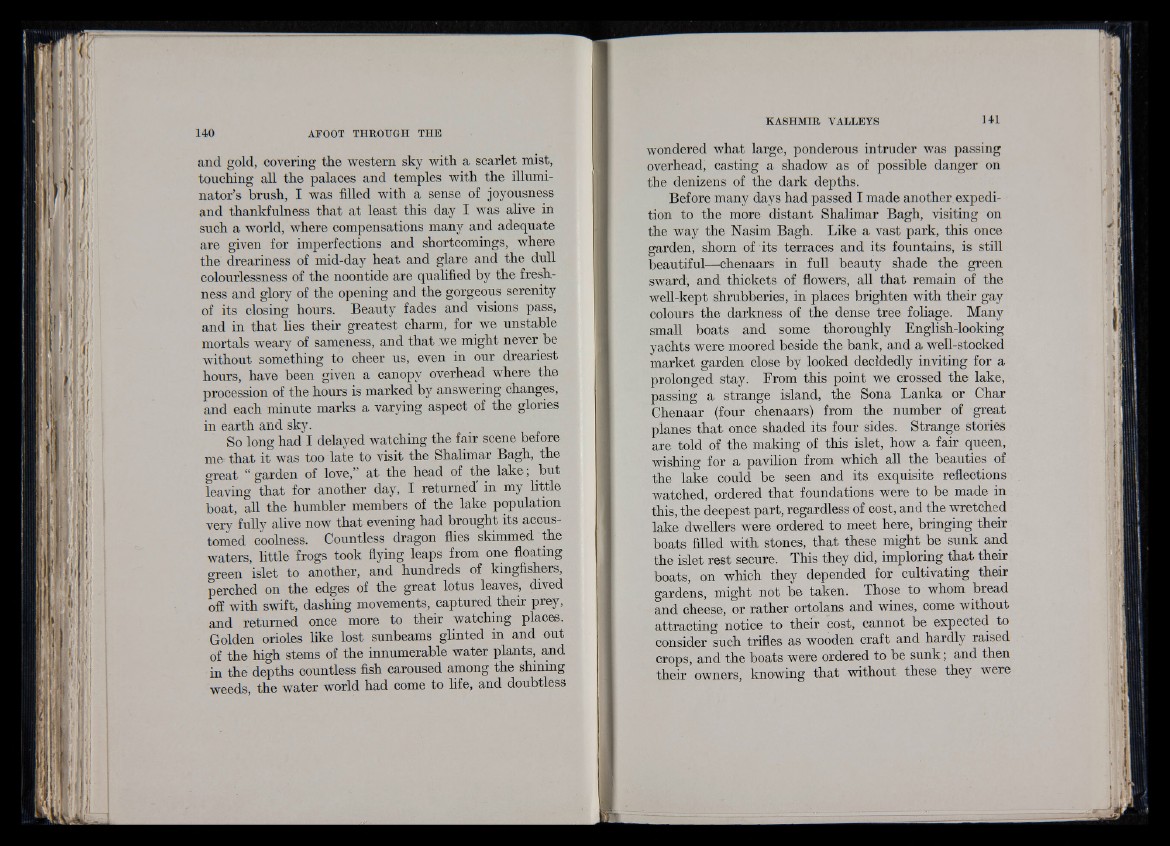
and gold, covering the western sky with a scarlet mist,
touching all the palaces and temples with the illuminator’s
brush, I was filled with a sense of joyousness
and thankfulness that at least this day I was alive in
such a world, where compensations many and adequate
are given for imperfections and shortcomings, where
the dreariness of mid-day heat and glare and the dull
colourlessness of the noontide are qualified by the freshness
and glory of the opening and the gorgeous serenity
of its closing hours. Beauty fades and visions pass,
and in that lies their greatest charm, for we unstable
mortals weary of sameness, and that we might never be
without something to cheer us, even in our dreariest
hours, have been given a canopy overhead where the
procession of the hours is marked by answering changes,
and each minute marks a varying aspect of the glories
in earth and sky.
So long had I delayed watching the fair scene before
me that it was too late to visit the Shalimar Bagh, the
great “ garden of love,” at the head of the lake; but
leaving that for another day, I returned' in my little
boat, all the humbler members of the lake population
very fully alive now that evening had brought its accustomed
coolness. Countless dragon flies skimmed the
waters, little frogs took flying leaps from one floating
green islet to another, and hundreds of kingfishers,
perched on the edges of the great lotus leaves, dived
off with swift, dashing movements, captured their prey,
and returned once more to their watching places.
Golden orioles like lost sunbeams glinted in and out
of the high stems of the innumerable water plants, and
in the depths countless fish caroused among the shining
weeds, the water world had come to life, and doubtless
wondered what large, ponderous intruder was passing
overhead, casting a shadow as of possible danger on
the denizens of the dark depths.
Before many days had passed I made another expedition
to the more distant Shalimar Bagh, visiting on
the way the Nasim Bagh. Like a vast park, this once
garden, shorn of its terraces and its fountains, is still
beautiful—chenaars in full beauty shade the green
sward, and thickets of flowers, all that remain of the
well-kept shrubberies, in places brighten with their gay
colours the darkness of the dense tree foliage. Many
small boats and some thoroughly English-looking
yachts were moored beside the bank, and a well-stocked
market garden close by looked decidedly inviting for a
prolonged stay. From this point we crossed the lake,
passing a strange island, the Sona Lanka or Char
Chenaar (four chenaars) from the number of great
planes that once shaded its four sides. Strange stories
are told of the making of this islet, how a fair queen,
wishing for a pavilion from which all the beauties of
the lake could be seen and its exquisite reflections
watched, ordered that foundations were to be made in
this, the deepest part, regardless of cost, and the wretched
lake dwellers were ordered to meet here, bringing their
boats filled with stones, that these might be sunk and
the islet rest secure. This they did, imploring that their
boats, on which they depended for cultivating their
gardens, might not be taken. Those to whom bread
and cheese, or rather ortolans and wines, come without
attracting notice to their cost, cannot be expected to
consider such trifles as wooden craft and hardly raised
crops, and the boats were ordered to be sunk; and then
their owners, knowing that without these they were